After a painstaking process that apparently consisted of determining from which movie/comic books they wanted to lift a name, members of the US Space Force have officially been dubbed “Guardians.” Whether this is in reference to Marvel’s Guardians of the Galaxy or the interfering blue dome-heads from Green Lantern is unclear. Either way, please enjoy five exciting stories about space patrols patrolling… SPACE!
(Note: I’m not going to mention E. E. “Doc” Smith and his Lensmen books or the Andre Norton novels about the Patrol. They’re canonical and I’m sure you’ve all read them.)
Crashing Suns by Edmond Hamilton (1965)
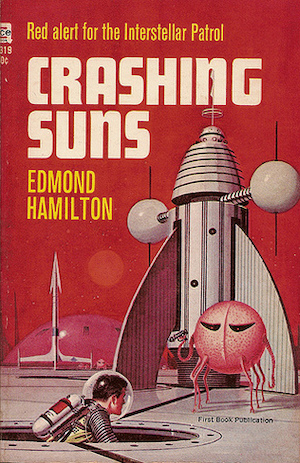
One hundred thousand years in the future, humanity is but one race among many providing officers to the Federated Stars’ Interstellar Patrol. Although little inconvenienced by plausible science, the Patrol bears a weighty responsibility, for the Milky Way and the other Island Universes are realms subject to entropy’s harsh rule. Again and again the Patrol encounters desperate civilizations endangered by the impending demise of their homes—from dimming solar systems to comets losing their charge to nebulas short on angular momentum—and again and again the Patrol ushers the unfortunates they meet into final extinction whenever their efforts to survive endanger the members of the Federated Stars. Which it seems they always do.
***
Raumpatrouille – Die phantastischen Abenteuer des Raumschiffs Orion (1966)
Of course, when one thinks “mid-1960s science fiction television program about a space patrol,” the first example that comes to mind are the adventures of the Schneller Raumkreuzer Orion and its crew as they patrol the star lanes. Major Cliff Allister McLane leads a multinational (and gender egalitarian) crew, protecting a united humanity against the dangers of the Milky Way. McLane and his crew’s bravery in the face of diverse challenges from natural disasters to technical malfunctions to the machinations of the alien Frogs1 is matched only by their talent for getting the Orion destroyed and replaced by a newer, shinier model—the seven-episode TV series made it to the Orion VII, whereas the novels mention an Orion X-C.
***
The Erinys Incident by Tani Kōshū (1983, trans 2018 by Simon Varnum)
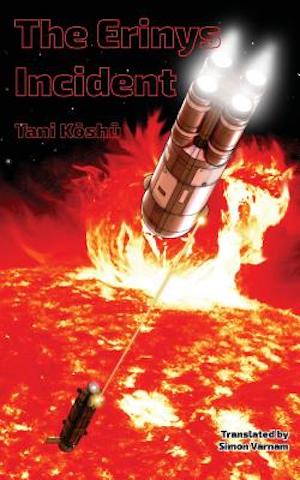
As bold as it was unsuccessful, the Outer Planet Revolt of 2099 was crushed by TerraLune’s AeroSpaceForce. A generation later, the Outer Planets Alliance launches a daring scheme to overthrow the government of the Uranian moon Erinys. It’s the first step towards an OPA takeover of the outer worlds! Key to the plan is the fact that Uranus and its moon are distant worlds, too far away for the ASF to mount a timely response. Alas for the freedom fighters, down towards the Sun, a mysterious space craft catches the attention of the ASF combat vessel Aquarius. If Aquarius can work out to which outer world the mystery vessel’s sun-skimming orbit will take it, then perhaps the revolt on Erinys will suffer the fate of the 2099 Revolt. If not, Erinys is only the first stepping stone in a grand plan to liberate the outer solar system!
***
A Matter of Oaths by Helen S. Wright (1988)
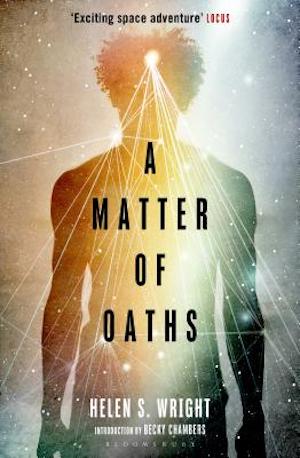
There are but three powers of note—the Old Empire and the New Empire, both ruled by their respective immortal emperors, as well as the Guild of Webbers that supplies both sides with starship crews—but the simmering conflict between empires, not to mention basic human cussedness, means an endless need for the services of patrolships like Bhattya to deal with raiders and the like. Being short-staffed, Bhattya’s Commander Rallya grudgingly hires Rafe. Rafe’s service record and qualifications are exemplary…enough so that Rallya is forced to overlook the alarming fact that Rafe was previously mind-wiped for reasons unrecorded. It is only once Rafe is a member of the crew that Rallya belatedly becomes aware of a fact that would have been nice to know before Rafe came on board: someone appears to want Rafe dead and to achieve this goal, they are quite willing to sacrifice everyone in Rafe’s vicinity. Including the crew of the Bhattya.
***
The Prefect by Alastair Reynolds (2009, later retitled Aurora Rising)
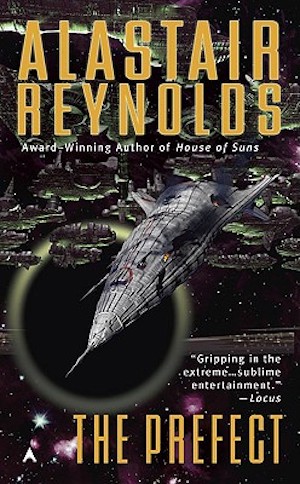
The ten thousand habitats orbiting marginally habitable Yellowstone in the Epsilon Eridani system, habitats comprising the Glitterband2, are diverse to a fault. However, they do acknowledge that peaceful coexistence requires someone to manage the inevitable conflicts. Thus, the Panopoly, which combines a vital role with legal powers that are highly constrained. Other law enforcement organizations might have weapons an army would envy and sovereign immunity protecting them from consequence: the Prefects of the Panopoly are essentially unarmed and require the active consent of the public they serve. Thus far, these limited powers have been sufficient for the Panopoly to effectively perform its duties without infringing overmuch on the civil liberties the Glitterband values so highly. Whether they will able to save the Glitterband from the existential threat even now bearing down on it is an interesting question.
***
No doubt you all have your favourite examples of space patrols and may even now be looking at me as if I were some sort of dim space cadet for failing to mention them. The comments are below!
In the words of Wikipedia editor TexasAndroid, prolific book reviewer and perennial Darwin Award nominee James Davis Nicoll is of “questionable notability.” His work has appeared in Publishers Weekly and Romantic Times as well as on his own websites, James Nicoll Reviews and Young People Read Old SFF(where he is assisted by editor Karen Lofstrom and web person Adrienne L. Travis). He is a four-time finalist for the Best Fan Writer Hugo Award and is surprisingly flammable.
[1]Later retconned to stand for “Feindliche Raumverbande ohne Galaktische Seriennummer,” or Hostile Space Combat Units Without Galactic Serial Identification Number.
[2]There are a number of parallels between the Glitterband and Vinge’s Heaven Belt. It only now occurs to me to wonder if this is a case of parallel development (see the link below for other examples) or if Reynolds was inspired by “The Outcasts of Heaven Belt”? See also: https://reactormag.com/2017/11/28/did-we-all-write-a-book-about-space-elevators-why-unfortunate-coincidences-happen-in-science-fiction/










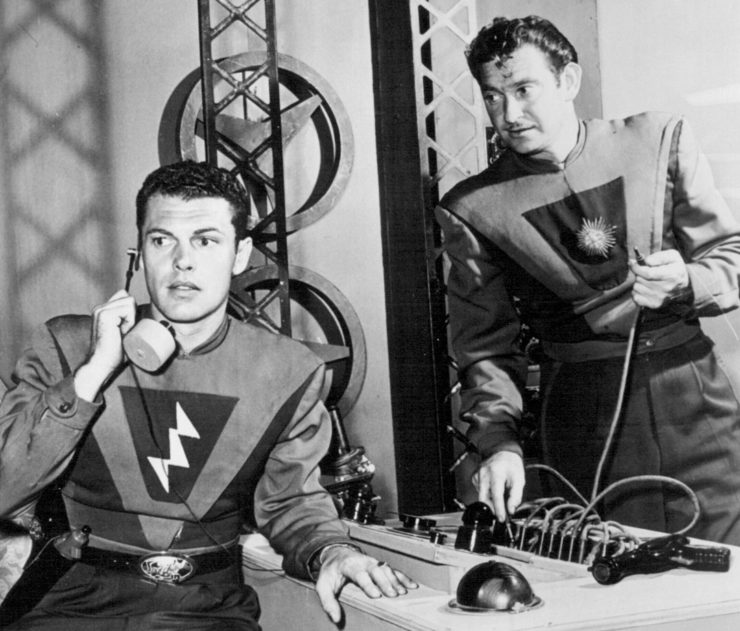
A) What did Frogs stand for? I really want to know.
B) A Matter of Oaths is the only one of these I have read, but it is excellent and I re-read it every few years just to enjoy it again.
Note 1 appears to be incomplete.
Augh! That should have read
Space Command!
I actually work for a contractor for part of Space Command! but I haven’t asked any f the (former) USAF people what they think about Space Command! or their assignment to it. The heck of it is, Space Command isn’t a bad idea. We have various intel and military space activities scattered across many places and unifying it a bit would probably bring some efficiencies.
Re: footnote–should be fixed now! It seems WordPress’ footnote widget is as easily defeated by German as it is by Elvish :/
Are Germans elves? Has anyone checked?
One that immediately springs to mind is Fearless by Allen Stroud. I can’t really recommend it though.
@6: Maybe? I think Tolkien’s main Elvish languages were more influenced by Finnish and Welsh, respectively, but FWIW I’m fairly sure the footnote widget was forged in the fires of Mount Doom and just refuses to play nice, regardless :)
I listened to a bunch of Tom Corbett: Space Cadet radio episodes during my run through SF radio shows and was very impressed at the body count for what I assume was a show aimed at kids,
“comets losing their charge”?! As in electrical charge?
Yes. These particular aliens live in a charged comet that was losing its charge so they basically wanted to rub it against the galaxy like the comet was a balloon and the galaxy a rug. I did say ” little inconvenienced by plausible science” and in this case any comprehension of scale.
I see what you did there.
You’ve left out the grandaddy of them all, Galactic Patrol (and the rest of the Lensman series).
That’s a hilarious description of Crashing Suns!
So, are the genocidal monsters in Crashing Suns supposed to be the good guys in these stories?
Love the pic! I spent some of my unexpected free time in 2020 watching TV’s space adventurers in the Truman Era. Space cadets, space rangers, Captain Video & Commander Corey—all this incredible, primeval stuff about lawmen on <ahem> the final frontier.
Sure the budgets were miniscule, the acting stiff, the imagination limited, and yep, the creators were all white & almost all male. But these teams were writing, producing, & broadcasting what amounted to half-hour stage-plays set in space, week in week out, up to 45 weeks a year. As a former theater professional, I have to admire that.
Tim @10: While James has given the official explanation @11, remember that Velikovsky claimed that Venus went ping-ponging around the solar system because the solar system is constructed like the electrons in orbit around an atomic nucleus, and Venus was just doing quantum jumping from level to level. Now apply this model to comets. If a comet lost its charge, it wouldn’t be able to move properly. :-)
One thing to remember about the collection _Crashing Suns_ is that the stories originally appeared in _Weird Tales_ in 1928-1930.
Here’s one I read obsessively when I was young. (n.b. This was already not a new book when I was young.) Kind of a couple of steps down from Heinlein’s Space Cadet (which I also loved), but still good fun. And with a remarkably poor understanding of the long-term effects of exposure to radiation sources.
Also currently available in eBook format (possibly under its original title, Rip Foster Rides the Gray Planet), although in the version I picked up, Chief O’Brian has somehow become Chief O’Brain.
In the UK the TV series that started this genre was the puppet show Space Patrol, which ran to 39 episodes – mostly set in the solar system, though they did use alien tech to go FTL at least once, and notable for some fairly good plot logic about things like using cold sleep for long flights, antigravity rather than rockets for fast travel, translating machines that had to be programmed via long recordings of alien languages, etc. They even remembered gadgets they’d used in previous stories when they needed to solve problems, rather than ignoring them. I was ten when it first aired in 1963 (the copyright date on some episodes is 1962 but they didn’t air then) and it was a lot of fun for a kid that age.
https://en.wikipedia.org/wiki/Space_Patrol_(1962_TV_series)
https://fanlore.org/wiki/Space_Patrol_(1963)
When I wrote the last Forgotten Futures RPG setting, based on Stanley Weinbaum’s SF, I had the League of Nations space patrol as the background for the adventures. That was …interesting… to write, because I had to reconcile everything Weinbaum had said about the different worlds and space travel in his stories, and I suspect he had not really imagined all the stories as being set in a single consistent universe.
Well the first things that popped into my head were Space Rangers a really short lived tv show from the 90’s about cops in space. Also something with Patrol in the title by Poul Anderson but it turns out that’s Time Patrol which is a slightly different flavor of adventure.
Anderson had at least one space patrol, though. The Coordination Service turns up in Virgin Planet and I think Star Ways as well.
Reynolds is absolutely inspired by “Outcasts of Heaven’s Belt”. One of his factions in the Revelation Space series are the Demarchists, and he calls out Vinge as inspiration for same in a story introduction.
And let us not forget that master of supermarionation, Gerry Anderson’s, Fireball XL5. That magnificent rail launched rocket ship, with space scooters, and the [in]famous oxygen pills. It even had its pop tune:
https://www.youtube.com/watch?v=hxec0-bJw90
I can’t think of the name, but Hal Clement (I think?) had a series of short stories about a space policeman pursuing a criminal. The criminal would escape; the pursuing policeman would catch up with the criminal, and both would find theselves in some sort of serious situation. The criminal would use his scientific knowledge to rescue them both from the situation after extracting a promise of a head start from the policeman (who always honored the agreement, thereby allowing the criminal to escape to the next predicament).
One of these, for instance: They find an asteroid crater that had been polished as a telescope mirror by some ancient alien race, with a near-frictionless surface. They fall in, and begin to fall to the bottom, and rise slowly to within a few feet of the rim on the other side before sliding back down. The thief comes up with a plan; they hold hands and begin spinning around their center of gravity. Near the top of one arc, they release each other, and the energy from the spin pushes each over the rim (far apart).
I originally wanted to mention the policeman as an example of a Space Patrol person, but now, frustrated at being unable to find any mention of these stories via Googling, wonder if anybody else has a better memory than I? I have a book with these stories in it somewhere, but in a box, probably.
Harry Harrison’s “The Men From P.I.G and R.O.B.O.T“ was a memorable juvenile for me. One patrol uses a herd of modified pigs for support and backup, the other all sorts of clever AI.
And then there’s the quintessential mid 80s The Adventures of the Galaxy Rangers, if we’re doing TV cult shows. Good god the computer usage dated *fast*. More Texas Rangers In Space than a true police force though.
@25: You want The Men and the Mirror, by Ross Rocklynne, one of three Colbie and Deverel stories, collected in a book of the same name.
@@@@@ 27: Thank you! No wonder I couldn’t find any mention of it under Hal Clement’s works! I appreciate it.
On-topically, the late Christopher Stasheff’s original The Warlock in Spite of Himself (and dozens of sequels) featured Rod Gallowglass, who was supposed to safeguard democracy (but not to, for instance, prevent space piracy).
Anderson had a couple of different space patrols, as I recall.
@5, if it was the a-umlaut which killed the widget, the usual workaround is to write ae/oe/ue instead. The little dashes or dots above the letter are the remnants of a shrunk e …
@6, often insufferably smug, yep, but the etheral beauty is missing. More like dwarves, or perhaps hobbits when it comes to beer and Brotzeit.
@6,
I thought the Swiss were the elves, but maybe that only applies to the Swiss in the banking sectors.
—
In any case, the only one of these books I remember reading is The Prefect. I’ve not watched Raumpatrouille – Die phantastischen Abenteuer des Raumschiffs Orion, mostly as I’ve never heard of it, nor read The Erinys Incident, as my sf reading has been severely curtailed due to a) time b) budget and c) libraries that don’t buy anywhere near enough sf/f.
Space Patrols do show up in a lot of sf, frequently as semi-incompetent police agencies, there mostly to inconvenience the criminal protagonist as they try to escape prosecution for their crimes perform heroic deeds.
In Jack Vance’s Demon Princes (and other) stories, there was the IPCC, Interworld Police Coordinating Company. Nominally a private concern, it operated ‘beyond the Pale’ (?) in the lawless areas. Nicknamed ‘The Weasels’, and opposed by the Deweasleing Corps.
I frankly don’t care that the author “skipped” them: the Lensmen series and Norton’s Space Patrol are the BEST. They are incomparable. The “Space Force” created by the now Twice Impeached Dofus — whom we all know has NEVER read anything scifi at all — is a joke and a waste of money. Yes, the idea is sound enough, but it needs to be an outgrowth of the USAF and NASA combining the military needs (if any are found) with Science. Why waste time and money on recreating the wheel: uniforms; logos: oh, I forgot, a bureaucracy so more cupidity can be accommodated? As it is, we already have more incompatible technology than anyone needs. On a lighter note, how come someone has not optioned Lensmen? Updated the female parts — I have really thought Worsel made better sense as a female, and Clarissa should make fake Wonder Woman look the fool she is if properly handled — and not in a swimsuit. War nurses are brave, heroic figures; look at both WW I and II even in the worst of patriarchy, so it’s natural they could be “real” lensmen.
There was an unlicensed Lensman adaptation.
K.B. Wagers’ A Pale Light in the Black is essentially the Coast Guard in space and it’s really good!
What about A. E. van Vogt’s Voyage of the Space Beagle?
Wasn’t Space Beagle more of an exploration mission than a patrol?
@37, JDN: I read VotSB when I was in high school. My memory is fuzzy. So, I looked up the Wiki article on it. You are correct.
It happens that it’s the only Van Vogt I’ve reviewed, on account it being pretty much the only VV I managed to finish.
@39, JDN: I had a similar experience with Vogt’s The World of Null-A. Although, TWoN got me interested in General Semantics.
I should add that I read VotSB in 1979 and TWoN in the early 2000s.
Don’t knock AE VanVogt, he was a visionary.
After all, years before CS Lewis wrote about Aslan, VanVogt wrote about a Slan…
@42, Dr.T: I’m not knocking him. Vogt had some interesting ideas. As I wrote above, TWoN got me interested in General Semantics, which I found illuminating on the subject of language and how words are used, misused and abused in describing things, events, people, etc. However, I am no general semanticist.
@34: There’s also a Japanese feature film length anime from the same year. It is bad. It is very bad.
I suppose Ken MacLeod’s The Cassini Division is too recent (or too limited to near-Saturn space) to count?
@25 and 27: Needle by Hal Clement (1950) and a less good (imho) sequel Through the Eye of a Needle (1978)
Hunter is a sort of interstellar policeman and is in pursuit of a member of his own species. They crash on Earth and Hunter has to find his quarry – a situation complicated by the aliens being able to live within a host body…
Andre Norton’s “Star Rangers” was one of my favorites (retitled later as “The Last Planet” I think).
No one’s mentioned Marshal Bravestarr yet?!
I would think James H. Schmitz “Agents of Vega” would count, as would some of the agencies in his Hub universe, though they all have his particular twist on the notion of an interstellar patrol.